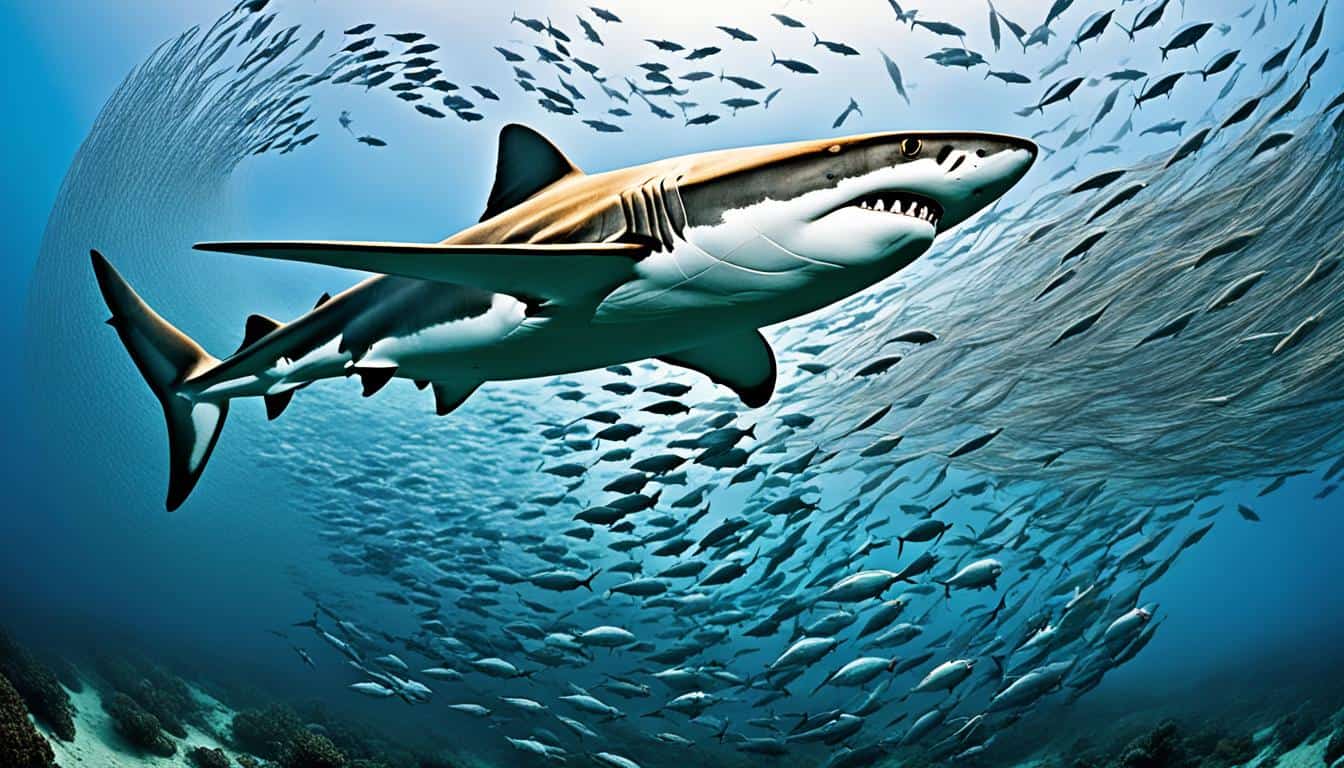Sharks have been in the ocean for over 440 million years, surviving five mass extinctions. But, a disturbing fact has come to light: 71% of shark populations have decreased since 1970. You might wonder: are sharks endangered? This piece will look into their current conservation status and the reasons behind their decline. We’ll also talk about the global efforts to save these amazing sea creatures.
Understanding Shark Conservation Status
The shark conservation status is key to the health of our oceans. Groups like the International Union for Conservation of Nature (IUCN) check on sharks often. They use the IUCN Red List to share important info. Sadly, over one-third of sharks are at risk of disappearing, showing we need to act fast.
Looking into the numbers, we see that 121 out of 1,199 shark species are Endangered. Another 90 are Critically Endangered. This shows how many sharks are in trouble and we must act now to save them.
| Conservation Status | Number of Species |
|---|---|
| Critically Endangered | 90 |
| Endangered | 121 |
| Vulnerable | 201 |
| Near Threatened | 117 |
| Least Concern | 682 |
Knowing these facts is key to making better conservation plans. It helps us push for policies to protect these important animals.
The Decline of Shark Species Population
Over the past few decades, the decline in shark species has reached alarming levels. Many shark species face threats from human activities. Overfishing is a major issue. Sharks have a hard time surviving in waters heavily fished, thanks to their slow breeding rates.
Global shark statistics show that about 31.2% of shark species are threatened with extinction. This number is expected to get worse unless we act fast. The urgent need for conservation efforts is clear.
Knowing about the decline of sharks can help us act to save them. Everyone, from individuals to governments, can make a difference. By supporting sustainable fishing and conservation efforts, we can help protect sharks.
Are Sharks Endangered? The Current Reality
Sharks are facing big threats, putting them at risk of becoming endangered. You might ask, are sharks endangered? The truth is, sharks are in a tough spot, with about 33% of the 1,199 species at risk of disappearing.
Species like the Great White shark and the Whale shark are in danger. The Great White is considered Vulnerable, and the Whale shark is Endangered. These threats come from overfishing, harming their homes, and climate change. Losing these important animals can harm the ocean and shows we need to act fast.
Shark Extinction Risk Factors
Sharks face many threats that put their survival at risk. Overfishing is a big problem. They have slow reproduction rates, making them easy targets for overfishing. This leads to a big drop in their numbers.
Habitat degradation is another big issue. Pollution and climate change cause this. Sharks lose their homes, like coral reefs and coastal waters, which they need for food and breeding. This makes them more likely to go extinct.
Bycatch in fishing gear is also a big problem. Millions of sharks get caught by accident while fishermen target other fish. This makes saving sharks harder and shows we need better fishing ways.
| Risk Factor | Description | Impact on Sharks |
|---|---|---|
| Overfishing | Excessive catching of sharks beyond sustainable levels. | Decline in populations and inability to recover. |
| Habitat Degradation | Destruction of environments through pollution and climate change. | Loss of feeding and breeding grounds. |
| Bycatch | Unintentional capture of sharks in other fisheries. | Increased mortality rates and reduced overall populations. |
Impact of Shark Overfishing
Shark overfishing is a big threat to the ocean’s health. Many sharks are being caught too much, leading to a big drop in their numbers. This is mainly because of illegal fishing for their fins and meat.
Most common sharks caught for their fins are now at risk. This shows how dangerous our fishing ways are. We’re choosing quick profits over keeping the ocean healthy for the future.
It’s important to understand how sharks and fishing are connected. We need to fish in a way that lets sharks survive. This means working together to make better fishing rules.
| Fishing Practice | Impact on Shark Populations | Current Status |
|---|---|---|
| Illegal Finning | Drastic population decline | Widespread problem |
| Bycatch | Unintentional kills of various species | Significant concern |
| Recreational Fishing | Increased stress on local populations | Regulation needed |
| Commercial Fishing | Targeting vulnerable species | Urgent need for reform |
We must act to stop the harm from shark overfishing. Supporting sustainable fishing is key to saving these important sea creatures for the next generations.
Global Shark Conservation Efforts
Many groups work on saving sharks worldwide. They tackle big challenges these sea creatures face. Efforts range from local to global, aiming to spread awareness and change policies.
International agreements are key in protecting sharks. They set rules for fishing and help keep shark habitats safe. Groups work hard to make sure these rules are followed, helping sharks recover.

It’s important to support sustainable fishing. By working with fishermen and scientists, we can reduce harm to sharks and protect them. This balance helps keep the ocean healthy.
Teaching people about sharks helps conservation efforts too. Programs for schools and communities get more people involved in protecting sharks. This way, future generations will know how to save these important animals.
Endangered Shark Species You Should Know
Many shark species are in danger and need our help. The Pondicherry shark is one of them, often overlooked but very important. The Ganges shark is also at risk, facing threats from habitat loss and overfishing.
Knowing about these endangered sharks is key to saving them. By learning more, you can help protect them. Sharing what you know can spark more interest in saving these sharks.
| Shark Species | Status | Main Threats |
|---|---|---|
| Pondicherry Shark | Endangered | Habitat loss, overfishing |
| Ganges Shark | Endangered | Overfishing, pollution |
| Hammerhead Shark | Threatened | Overfishing, bycatch |
| White Shark | Vulnerable | Bycatch, hunting |
Shark Protection Initiatives and Their Importance
Shark protection efforts are key to saving the declining shark populations worldwide. By creating safe marine areas, groups help sharks live without fishing threats and habitat loss. These safe spots are good for sharks and make the ocean healthier, showing why protecting sharks is so important.
Strict fishing rules are also crucial for shark safety. These rules limit shark catches and stop accidental catches of other sea creatures. Supporting sustainable fishing helps keep the ocean’s balance, which is good for many sea species. Without these rules, the ocean could suffer greatly.
Getting communities involved in ocean protection is also crucial. Local support makes conservation efforts more likely to succeed. By joining in on education and conservation, you help others understand why sharks and their homes need our care. Protecting sharks helps all sea life and creates a strong, healthy ocean for everyone.
FAQ
Are sharks endangered?
Yes, many shark species are endangered. Over one-third face threats of extinction. This is due to overfishing and habitat damage.
What is the current conservation status of sharks?
The IUCN tracks sharks’ conservation status. They assess species based on their vulnerability and population decline.
How have shark populations declined?
Since 1970, shark populations have dropped by 71%. This is due to overfishing, habitat loss, and climate change. They are now at risk of extinction.
What are the main factors contributing to shark extinction risk?
Overfishing, slow reproduction, bycatch, and environmental changes harm sharks. These factors increase their extinction risk.
What are the impacts of shark overfishing?
Overfishing reduces shark populations drastically. This harms marine ecosystems and threatens species that rely on sharks.
What global efforts exist for shark conservation?
Global efforts include international agreements and marine protected areas. These aim to promote sustainable fishing and protect endangered sharks.
Which shark species are currently considered endangered?
The Great White shark, Whale shark, Pondicherry shark, and Ganges shark are endangered. They face threats from human activities.
Why are shark protection initiatives essential?
Shark protection is vital for reversing their decline. It helps preserve marine ecosystems and ocean biodiversity. Healthy shark populations are key.







